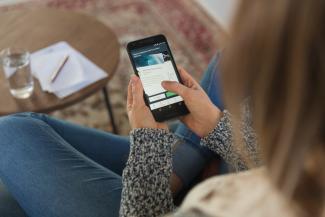
Digital Minimalism: A Solution For An Over Connected World
If you ask the average person, most would say that they are stressed out, have trouble unwinding, sleeping, and constantly worried about politics. We are also seeing anxiety as an epidemic, particularly in our younger populations. There are many factors contributing to this, and a big one is technology and information overload. We are connected more than any generation in the history of the world. We also have access to anything we could possibly want to know. In fact, you can teach yourself almost any skill online. But what price has this all come with?
The human brain was not meant to be connected, stimulated, and processing information 24/7. Our brains need time to unplug from technology of all kinds. In his book Digital Minimalism, Cal Newport notes that this phenomenon has led to zombie-like mindless scrolling on our phones, not doing anything in particular. We aren’t meant to take in that much input from other people. Cal conducted research around this topic for his book and found that one of the hardest parts of unplugging was that people literally didn’t know what to do with themselves to fill the void that technology has filled. In fact, we have used it as a buffer instead of dealing with the stressors of life. He also found that when people engaged in a 30-day digital detox - abstaining from all technology possible except that which is absolutely necessary, professionally and personally. The participants found that they would reach for their phones and start shuffling around their home screen (with most of their apps deleted) without even realizing it or knowing what exactly they were looking for. We need time to decompress from the day and mentally sort out our troubles instead of numbing ourselves with mindless scrolling.
Research has also shown a definitive link between a decrease of wellbeing and in mental health (such as anxiety and depression) directly correlated to social media use. In a landmark study, “No More FOMO: Limiting Social Medial Decreases Loneliness and Depression”, it found that people who use social media the least experience the least amount of loneliness and depression. What’s ironic is that even as connected as we are on social media, it actually has the opposite effects on relationships.
One of the most compelling reasons to cut back on excess technology and social media is the time that is wasted. Research firm Dscout has found that in a single day we’ll touch our smartphones 2,617 times, check email 74 times, and receive 46 notifications. We’ll spend more than 3 hours on our phones and tablets, 40 minutes on our home computer, and almost 5 hours watching TV every day. You are basically working another job with those kind hours! But the biggest take-away is that you are trading your time, which is really your life, for mostly mindless scrolling and nothingness.
Ways to Minimize Technology:
Luckily, there are some proven strategies to help us become aware of our media usage in addition to decreasing the time we spend on it:
- Do a 30-day digital detox. As previously mentioned, this is abstaining from all media other than absolutely necessary to function professionally or personally. Examples would be to keep your work email and continue texts from your child in regard to their school pick up. But social media, Netflix, and even binge watching the news needs to be placed on pause. Spend this time evaluating what media usage truly benefits your life and even set parameters around when and how you will engage with it after 30 days. An example of this is sitting down to read/watch news during a designated time of the day instead of having the same news on repeat all day long popping up with multiple notifications. Most study participants found that abstaining from most media for 30 days made them lose their desire to be constantly consuming the vast majority of it.
- Find activities that you enjoy while disconnected. Discover what you enjoy doing that keeps you physically active, working with your hands, and interacting face to face with others such as board games or an in-person coffee date and conversation. Go to the gym, take long walks (unplugged!), cook, bake, paint, read, etc.
- Take social media off your phone and log in through your computer. This little difference was found in studies to significantly decrease usage in and of itself. Social media, specifically on your smartphone, uses the same technology as slot machines with their constant scrolling, swiping, and red notification pop ups. It’s literally addicting to your brain. By simply logging in via your computer, it creates enough of a barrier to help mitigate time spent online.
- No phones in the bedroom. I promise you that if you have any trouble sleeping, this is the most important thing you can do and will see improvements immediately. Cut off all screen time 1-2 hours before bed and turn your clock away from you so you can’t watch the time throughout the night.
- Move relationships offline and into real life. Most people say they remain on social media to stay in touch with friends and family. Why not make an effort to actually reach out to them instead of passively “liking” things they post? Relationships are not the same face to face versus online. We need true connection with others and cannot get this virtually.
If you are feeling stressed, anxious, tired, and not sleeping and need a change, try cutting out the excess and re-evaluating what is important to you. Give your mind a break, embrace down time and silence, sit with your thoughts, and enjoy life and relationships in real life. I am personally in the process of doing this very thing and invite you to join me. You will be surprised how little you may desire to be online afterwards and how quiet and peaceful life is as a result!

